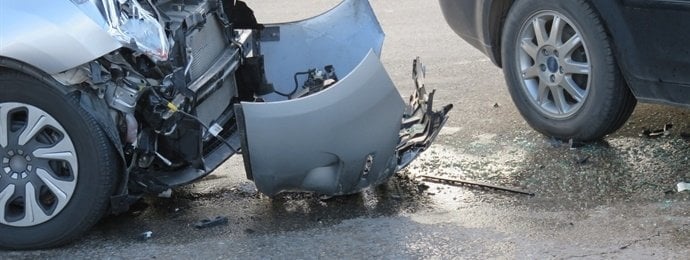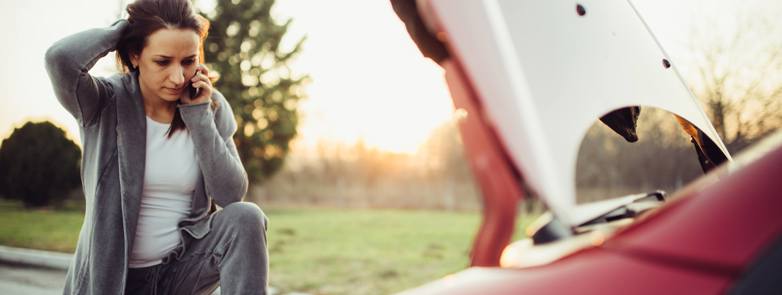What happens if my leased vehicle is involved in an accident?
Accidents happen all the time and vehicle accidents on the road are no exception. In fact, scouting around the internet reveals that the odds of being involved in a car accident in the next 10 years is 88-1, and a fatal one 606-1. So what should you do if you are involved in an accident, and what should you do if your leased vehicle is involved?
What to do if you are involved (in some way) in an accident

There is plenty of advice out there to give you the dos and donts when it comes to behaviour when involved in an accident - Which, Accident Exchange, and The AA being some of the better ones - but here is a set of guidelines to follow.
- It is an offence if you either fail to stop at the scene of an accident or fail to report an accident in which you are involved. In fact, if the accident involves injury to someone else apart from yourself or an animal, or involves some sort of damage to property, there are certain things that you MUST do to avoid breaking the law and to help any possible future insurance claim.
- Under the Road Traffic Act 1988 section 170, it is compulsory to stay at the scene of an accident if you are the driver involved, but it is advisable to stop and remain at the scene for a reasonable period, even if your car was not directly involved in the accident, but your presence at the scene was a factor in it.
- Give your vehicle registration number, your name and address, and that of the vehicle owner (if different) to anyone with reasonable grounds for asking for those details such as police, ambulance, fire crew or doctor. If you don't exchange those details at the scene, you must report the accident at a police station or to a police constable as soon as you can, and in any case within 24 hours.
“If you are involved in an accident in your lease vehicle, you must notify the finance provider and your insurance company immediately, even if the damage is minimal.”

If another person is injured it is compulsory to:
- Produce your certificate of insurance, if anyone at the scene has reasonable grounds to see it. Even if there is no personal injury involved, if someone feels that you are responsible for the accident, they can request your insurance details. You can respond at a later date if you don't have them to hand, but failure to provide the information without a reasonable excuse is an offence.
- If you don't have it to hand, or are unable to get it there and then, when reporting the accident to the police later, you may take it, within seven days of the accident, to your nominated police station. You must report the accident in person.
- Failure to comply with these obligations is an offence in law under the headings of 'Failing to stop' and 'Failing to report', with the guilty penalty for each including a maximum fine of £5,000 and five to ten penalty points, along with the possibility of six months' imprisonment and disqualification from driving.
Telling your insurer

You also need to report the accident to your insurance company within a reasonable time, even if you are not claiming yourself, as failure to do so can invalidate your cover.
“If you decide to pay for the repairs to preserve your no-claims discount, make sure you speak to your finance provider first to determine whether its approval is required. Usually, all repair work must be completed to a professional standard by repairers who provide a full warranty on their work.”

But you do still need to tell them that you have been in an accident and you should supply this information in a letter, telling your insurer what happened, but making it crystal clear that this is for ‘information only’ and that you don’t wish to make a claim.
This is because its helps to cover the fact that the other driver may claim against you, even if there was no personal injury involved. Whether or not you feel that you have no responsibility for the accident , if someone thinks that you are, they have the right to request your insurance details - and not always at the scene of the accident.
Your insurance policy will have a clause in it stating that it is compulsory to report any accidents to your insurance company within a reasonable time, even if you don’t want to claim yourself - and that reasonable time will actually be stated too! Failure to comply may result in you failing to get insurance in the future from your current insurer and maybe others too.
What to do at the scene of the accident
Whether or not the accident is your fault, it is important to get a detailed description of what happened along with as much information as possible - and this means collecting as much information - photographs and notes - as you possibly can while at the scene. Make use of the camera available on phones, and as difficult as it may be:
- Scene - Make a note of the date and time, the address and location of the accident, what both the weather and traffic conditions were like, and take pictures of any road markings, road signs and traffic signals.
- Vehicles - Note down the make, model, registration number, colour, and condition of all vehicles involved. Make sure that you write down details of the estimated speeds at the time, the direction the vehicles were going in, the number of people involved (including passengers) , and whether any lights were on and/or indicators used.
- People - Collect the contact details of other drivers involved as well as passengers, pedestrians and witnesses. It may be an idea to note down a description of the other driver(s) including any distinguishing features as well as the details of any police officers involved.
- Damage - Make sure you collect and photograph any damage to vehicles and property as well as any injuries to people involved
What to do if your car is a lease car
Any damage to the car that is covered by insurance needs to be carried out to their specifications, and a courtesy call to your leasing company would be expected.
If your lease vehicle has been declared a 'total loss' - that is: written off or stolen – the most important thing to do is contact Nationwide Vehicle Contracts immediately. This is so we can inform your finance provider who will insist upon written confirmation from your insurance company that the vehicle is a total loss before providing an amount for settlement of the vehicle contract.
All negotiations with your insurance company are your own responsibility and Nationwide Vehicle Contracts or the finance provider will not enter negotiations with your insurance company – this must be done by yourself.
It’s also worth noting that if your vehicle is written off (damaged beyond repair) by your motor insurer, there may be a ‘gap’ between what your insurer pays out and what you still owe on the car to the finance provider. If this is applicable, you will be responsible for this shortfall. This is where a GAP insurance policy may be of benefit to you. GAP insurance is an optional product which covers the monetary difference between the motor insurer pay out and the amount needed to pay the outstanding balance on your finance settlement. You can read more about GAP insurance in our GAP Insurance Explained guide.
You can, of course, choose to lease a new vehicle with Nationwide Vehicle Contracts if your existing lease is declared a total loss, however you will be required another processing fee and initial rental for your new vehicle as this is classed as a new agreement.
If you have any questions with regards to this, and with any other aspect of what is involved in leasing a car, take a look at the FAQ section of the website here where you can find the answers to many of the questions that customers often have about leasing.
Guide Information
Originally published: 13th September 2017
Last updated: 8th September 2020
